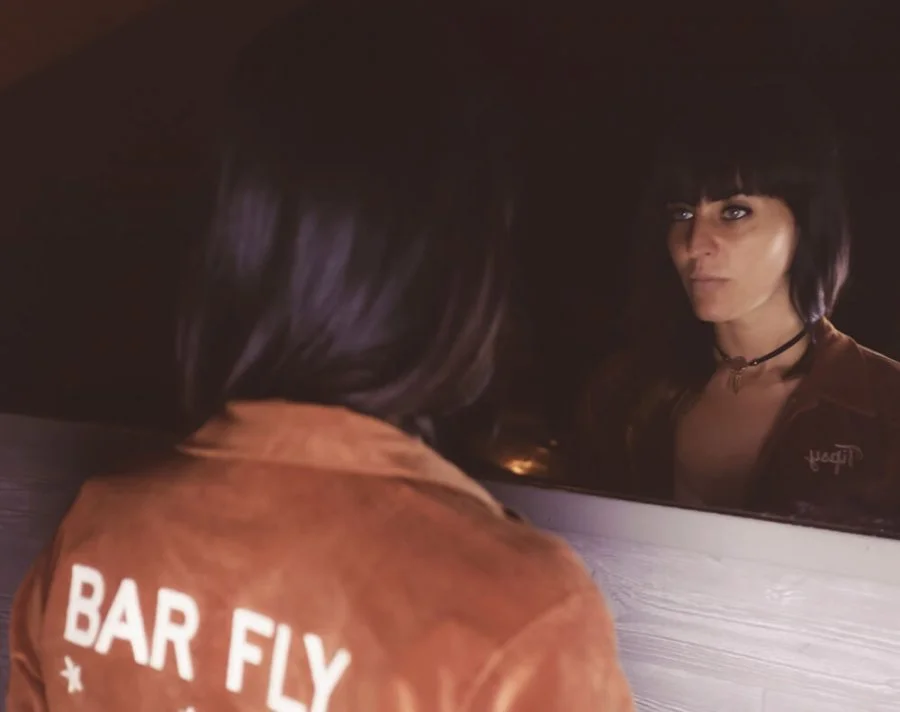The Loneliest Girl in Nashville: A Moment or a Century With ‘Americana’s Darkest Darlin’
The Loneliest Girl in Nashville: A Moment or a Century With ‘Americana’s Darkest Darlin’
The Loneliest Girl in Nashville: A Moment or a Century With ‘Americana’s Darkest Darlin’
“I wrote ‘Loneliest Girl in Nashville’ before I ever set foot in Nashville. When I wrote it, I wasn’t lonely and I wasn’t in Nashville. But it just hit me,” says French-American musician Pauline Andrès, discussing one of her songs with a glamorous accent. Now based in Nashville, ironically enough, she works by feeling her way through, led almost entirely by intuition. She's been dubbed “Americana’s Darkest Darlin',” though it remains blurry whether Andrès gave herself the epithet or obtained it elsewhere. She has embraced it all the same, peering at the world from behind black, blunt-cut bangs that brush over her light eyes like a curtain.“Loneliest Girl in Nashville” is an ode to Music City—sort of. Full of vocalists, songwriters and music industry hopefuls, all chasing their dreams like Andrès. It too has earned its own epithet.Andrès could read as just another artist hiding behind “authentic” posturing, but not if you listen, and certainly not if you keep reading. Many of her songs are anthems for wanderers and vagabonds, those of us just trying to get by. Her lyrics revere the commonplace, telling made-up stories that are all true. It's lyrics like this that have endeared Andrès to audiences: “Lord I miss my dog / And when I cry it’s her I’m thinking of.”Andrès has been based in Nashville since 2017 after moving from Berlin, but she has lived all over the world: Paris, London, the small town in France where she grew up and, now, the American south. Her unique brand of twang has fared much better here than it did in Europe. While techno, electronica and punk-rock have flourished there, largely immune to language barriers, Andrès’ tenderly crafted English lyrics did not. Though she’d never been to Nashville or lived in America, she thought: So ... why not?Along the way, Andrès endured a singer’s worst fear. After receiving medical attention for what she thought was a minor throat infection, doctors soon discovered she had a severely damaged vocal chord and told Andrès it was unlikely her voice would ever return. For over a year it didn't, and Andrès gave up on having a career in music altogether—though not without a fight. After thousands of dollars and hours upon hours sitting in vocal therapy sessions and doctor’s offices, she finally let it go. Maybe she just wasn’t meant to be a musician.[embed]https://open.spotify.com/album/5d2Dk3VwzbhT7ixlcSYaDo[/embed]Andrès doesn’t appear particularly amazed at her own story. And perhaps the most remarkable part isn’t the acceptance and persistence that finally did bring her voice back, but having to walk through each day carrying a very specific type of heartbreak: that letting go of a career in music was almost as impossible as trying to achieve it.That is, until her resolve was accidentally reignited by an artist’s most common catalyst. “It’s a very boring story, how I got back into music,” she says. “There was a dude, it didn’t work out, blah blah blah. And I ended up writing a bunch of songs about it.” Slowly, she began working with yet another vocal therapist and doing daily exercises to strengthen her voice, not only having to re-learn how to sing, but also how to talk. Somehow, it worked.“Nashville has mostly been good to me. But there are parts of the music business here that are really sad,” she says. “I’ve been in the industry for a long time, and a lot of how things happen is just not fair. Commercial music is one thing, but there are a lot of rich kids whose parents buy their way into it. That’s hard to watch, especially when you know many songwriters and artists who are so talented and deserve to make it, but don’t have the money or connections.”Suffice it to say, the eponymous network show “Nashville” starring Hayden Panettiere and Connie Britton may be entertaining, but according to Andrès, it’s largely fantasy. “You don’t just wait tables at the Bluebird Cafe and then get a record deal,” she says, noting the arc of one of the show’s main characters. “That takes most people years and a ton of hustle. If you’re an aspiring musician and you think that’s going to be your life if you move here, you’re totally wrong.”But what the filmmakers did get right, says Andrès, is ageism in the music industry, particularly how it’s leveraged against female performers—which drives the premise of the entire show. “That aspect of it is very real. You’re considered ‘old’ if you’re older than 25,” she says. “I remember a music publishing company that wouldn’t even listen to my demo because I was older than 25. Obviously they wanted a pretty young blonde girl to sing the song, but even then it made no sense. That doesn’t have to be the songwriter. The public doesn’t care, as long as the song is good. And they told me, ‘That’s just our policy.’”From breakups to the loss of her voice and an accidental pregnancy, Andrès jokes that every time she prepares to record in studio, she experiences a life-altering tragedy. “But that’s just life. Everyone is going through something.” Earlier this year, when several bills had been introduced into U.S. state legislatures severely limiting safe abortion access, including Tennessee, Andrès discovered she was unexpectedly pregnant.Through her own painful process of deliberation, she decided to undergo an abortion back home in France, where the procedure is covered for all women by the country’s universal health care and isn’t nearly as controversial. Women are rarely ridiculed or demeaned outside of clinics.“The whole thing was just really, really brutal on a personal level,” she says. “Some of the best friends I’ve ever made are in America, but the political state of the country right now is deeply worrying. There’s a lot of crazy happening. It makes no sense to criminalize women for something that is unfortunately just a part of life.”Predictably, it did conjure up a song within her: called “Sad Miracle,” Andrès says it wrote itself. At age 15 she’d been told it would be a medical impossibility for her to get pregnant, something she learned to live with for her entire adult life—until it wasn’t true. “I’m not proud or happy about making the decision to have an abortion, but I’m not ashamed either,” she says. “I know I did the right thing. And I know there are many other women who have the same experience.”Today, she can’t wait for people to hear her new single. Titled “Hoping for the Best at the Springwater Supper Club,” it took a while for her to get the vocals right. The song highlights one of Andrès’ favorite bars in the city, the Springwater Supper Club and Lounge, which she describes as “the dirtiest, oldest dive bar in Nashville. It’s a safe space, with so much soul. It’s where I go when I need something old and real.” From an upcoming EP called “Dive Bar Stories,” which will be released in 2020, listeners can expect lines that give voice to the human experience, like“I don’t know just what happens next/ I’m just sittin’ here smokin’ and hopin’ for the best.”Through it all, as the scene of much tumult and heartbreak, as well as moments of joy, Andrès just can’t stop writing about Nashville. “There’s still something very real about it. It’s a place that changes people.” After a moment, Americana’s Darkest Darlin’ qualifies this further. “As a musician, you either grow into your best self here, or you drown.”Images courtesy of Green Light Go Publicity.


